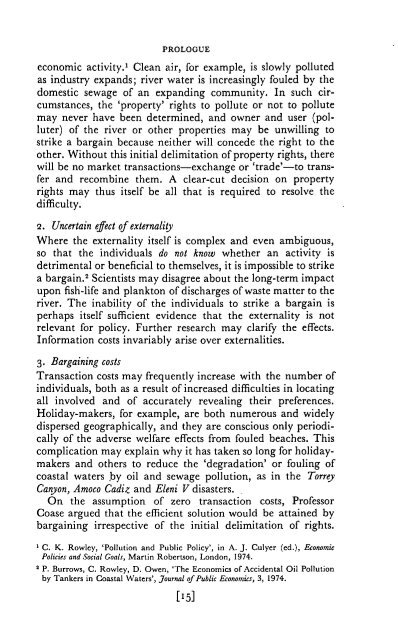THE MYTH OF SOCIAL COST.pdf - Institute of Economic Affairs
THE MYTH OF SOCIAL COST.pdf - Institute of Economic Affairs
THE MYTH OF SOCIAL COST.pdf - Institute of Economic Affairs
You also want an ePaper? Increase the reach of your titles
YUMPU automatically turns print PDFs into web optimized ePapers that Google loves.
PROLOGUE<br />
economic activity. 1 Clean air, for example, is slowly polluted<br />
as industry expands; river water is increasingly fouled by the<br />
domestic sewage <strong>of</strong> an expanding community. In such circumstances,<br />
the 'property' rights to pollute or not to pollute<br />
may never have been determined, and owner and user (polluter)<br />
<strong>of</strong> the river or other properties may be unwilling to<br />
strike a bargain because neither will concede the right to the<br />
other. Without this initial delimitation <strong>of</strong> property rights, there<br />
will be no market transactions—exchange or 'trade'—to transfer<br />
and recombine them. A clear-cut decision on property<br />
rights may thus itself be all that is required to resolve the<br />
difficulty.<br />
2. Uncertain effect <strong>of</strong> externality<br />
Where the externality itself is complex and even ambiguous,<br />
so that the individuals do not know whether an activity is<br />
detrimental or beneficial to themselves, it is impossible to strike<br />
a bargain. 2 Scientists may disagree about the long-term impact<br />
upon fish-life and plankton <strong>of</strong> discharges <strong>of</strong> waste matter to the<br />
river. The inability <strong>of</strong> the individuals to strike a bargain is<br />
perhaps itself sufficient evidence that the externality is not<br />
relevant for policy. Further research may clarify the effects.<br />
Information costs invariably arise over externalities.<br />
3. Bargaining costs<br />
Transaction costs may frequently increase with the number <strong>of</strong><br />
individuals, both as a result <strong>of</strong> increased difficulties in locating<br />
all involved and <strong>of</strong> accurately revealing their preferences.<br />
Holiday-makers, for example, are both numerous and widely<br />
dispersed geographically, and they are conscious only periodically<br />
<strong>of</strong> the adverse welfare effects from fouled beaches. This<br />
complication may explain why it has taken so long for holidaymakers<br />
and others to reduce the 'degradation' or fouling <strong>of</strong><br />
coastal waters by oil and sewage pollution, as in the Torrey<br />
Canyon, Amoco Cadiz and Eleni V disasters.<br />
On the assumption <strong>of</strong> zero transaction costs, Pr<strong>of</strong>essor<br />
Coase argued that the efficient solution would be attained by<br />
bargaining irrespective <strong>of</strong> the initial delimitation <strong>of</strong> rights.<br />
1 C. K. Rowley, 'Pollution and Public Policy', in A. J. Culyer (ed.), <strong>Economic</strong><br />
Policies and Social Coals, Martin Robertson, London, 1974.<br />
8 P. Burrows, C. Rowley, D. Owen, 'The <strong>Economic</strong>s <strong>of</strong> Accidental Oil Pollution<br />
by Tankers in Coastal Waters', Journal <strong>of</strong> Public <strong>Economic</strong>s, 3, 1974.<br />
[15]












